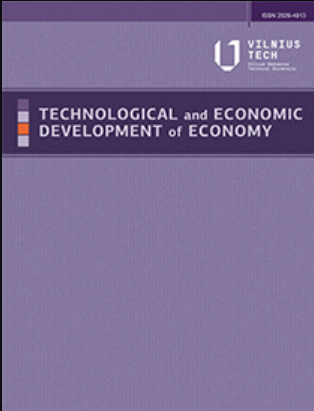技术进步是促进还是防止贸易冲突?来自中国的证据
IF 4.8
2区 经济学
Q1 ECONOMICS
引用次数: 0
摘要
本研究利用中国的自引导滚动窗口子样本格兰杰因果检验,分析了技术进步(TP)对贸易冲突(TC)的影响。结果表明,技术进步既能促进贸易冲突,也能防止贸易冲突。2012 年和 2018 年,技术进步导致中国与其贸易伙伴之间的贸易冲突增多。这一结果证明了 "贸易损失效应",即一国的贸易保护会通过威胁其他国家的收入来促进贸易冲突。然而,2021 年和 2022 年,贸易保护对贸易冲突产生了负面影响。这一结论与 "福利效应 "相一致,即贸易保护可以通过为全球消费者提供更多质优价廉的产品来防止贸易逆差。本研究建议,政府在鼓励贸易保护时应采取适当的贸易政策,以促进双边贸易。此外,企业应通过技术创新开发自己的高质量不可替代产品,以应对贸易摩擦风险。本文章由计算机程序翻译,如有差异,请以英文原文为准。
DOES TECHNOLOGICAL PROGRESS PROMOTE OR PREVENT TRADE CONFLICT? EVIDENCE FROM CHINA
Using the bootstrap rolling-window subsample Granger causality test from China, this study analyses the influence of technological progress (TP) on trade conflict (TC). The results show that TP can both promote and prevent TC. In 2012 and 2018, TP led to more trade conflicts between China and its trading partners. This result proves the “trade-loss effect”, suggesting that TP in one country promotes TC by threatening other countries’ income. However, TP had a negative influence on TC in 2021 and 2022. This finding is consistent with the “welfare effect”, implying that TP can prevent TC by providing more high-quality and cheaper products for worldwide consumers. This study suggests that the government should adopt appropriate trade policies when encouraging TP to promote bilateral trade. Furthermore, firms should develop their own high-quality irreplaceable products through technological innovation to address TC risk.
求助全文
通过发布文献求助,成功后即可免费获取论文全文。
去求助
来源期刊
CiteScore
10.00
自引率
8.50%
发文量
66
审稿时长
15 weeks
期刊介绍:
Technological and Economic Development of Economy is a refereed journal that publishes original research and review articles and book reviews. The Journal is designed for publishing articles in the following fields of research:
systems for sustainable development,
policy on sustainable development,
legislation on sustainable development,
strategies, approaches and methods for sustainable development,
visions and scenarios for the future,
education for sustainable development,
institutional change and sustainable development,
health care and sustainable development,
alternative economic paradigms for sustainable development,
partnership in the field of sustainable development,
industry and sustainable development,
sustainable development challenges to business and management,
technological changes and sustainable development,
social aspects of sustainability,
economic dimensions of sustainability,
political dimensions of sustainability,
innovations,
life cycle design and assessment,
ethics and sustainability,
sustainable design and material selection,
assessment of environmental impact,
ecology and sustainability,
application case studies,
best practices,
decision making theory,
models of operations research,
theory and practice of operations research,
statistics,
optimization,
simulation.
All papers to be published in Technological and Economic Development of Economy are peer reviewed by two appointed experts. The Journal is published quarterly, in March, June, September and December.

 求助内容:
求助内容: 应助结果提醒方式:
应助结果提醒方式:


